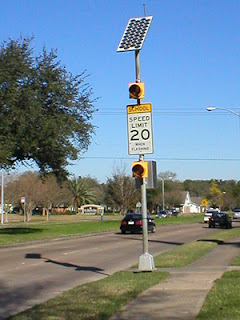
The concept of using road surfaces to generate clean solar power is actually already moving beyond the idea stage. Roads absorb heat from the sun every day and are usually free of sightline obstructions that could otherwise block the transmission of light rays. And if the roads built for cars and driving are partly to blame for global warming, why not make them part of the solution too?
Idaho-based company Solar Roadways is one of the trailblazers. Electrical engineer Scott Brusaw was inspired to start the company when he heard Caltech solar energy expert Nate Lewis suggest that covering just 1.7 percent of continental U.S. land surface with photovoltaic solar collectors could produce enough power to meet the nation's total energy demand.
Brusaw put two and two together when he realized that the interstate highway system already covers about that much of the nation's land surface, so he got to work designing a system that combines a durable and translucent glass road surface with photovoltaic solar collectors that could be wired directly into the electricity grid. Brusaw's innovative design would also heat the roads in winter, thus providing a important safety benefit.
With improvements in the efficiency of solar collectors in recent years, Brusaw believes his system, if implemented from coast-to-coast in place of the tarmac on existing highways, could produce enough energy to meet the entire world's electricity needs.
But skeptics wonder whether such an expensive high-tech road surface can stand up to the rigors of everyday use—from overloaded 18-wheelers putting extra stress on the highway to oil spills seeping into expensive electronic circuitry—without having to be replaced or repaired often. Brusaw acknowledges that his system still needs fine-tuning, but in the meantime is developing a working prototype along a 45-mile stretch of road between the Idaho cities of Coeur D'Alene and Sandpoint.
Europeans are also pioneering ways to use the sun's rays to work as they beat down on roadways. The British firm Astucia has developed a road stud that contains small solar panels and emits LED light to illuminate dark roadways. On the 120 U.K. roads where the new studs have been installed, night-time accidents are down some 70 percent.
And the Dutch firm Ooms Avenhorn Holding BV has developed a way to siphon solar heat from asphalt road surfaces and use it to de-ice roads and help power nearby buildings. A latticework of pipes under the road surface allows water to heat up during warm weather. The water is then pumped deep under ground where it maintains its higher temperatures and can be retrieved months later to keep road surfaces ice-free during winter months. Apartment buildings, industrial parks and an air force base have benefited from the innovation, and the firm is working on exporting its system to other countries in the coming years.
http://www.insightnews.com/health.asp?mode=display&articleID=4027





No comments:
Post a Comment